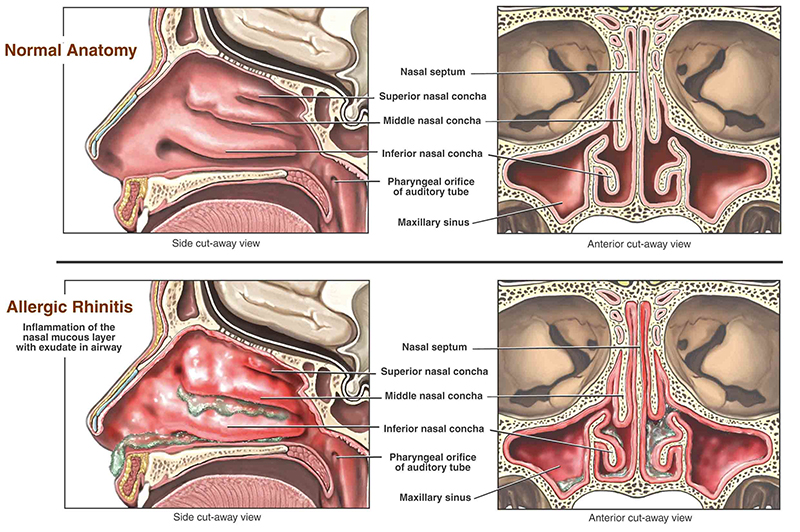Contact Us
Refer a Patient with Pediatric Allergic Rhinitis (Nasal Allergies)
Allergic rhinitis is also known as seasonal allergies, hay fever or nasal allergies, and is characterized by itchy, watery eyes, sneezing and other sinus symptoms. It is triggered by allergens such as pollen, mold or dust that enter the body through the nose or mouth (inhalant allergens).
The body’s immune system is designed to protect from harmful germs and bacteria. Sometimes, when the immune system mistakes pollen or allergens for something more serious, it can mount an immune response, which may lead to the release of inflammatory cells and mediators.
This response causes nasal passages, sinuses and eyes to swell and can create other symptoms such as coughing, sneezing or watery eyes. These symptoms are a result of the body trying to get rid of the allergens or prevent them from entering.

Allergic rhinitis is usually classified by the frequency and severity of symptoms and episodes. Depending on the classification, your child’s doctor can create a treatment plan that will manage nasal allergy symptoms and bring relief.
Frequency refers to how often your child experiences symptoms. It is divided into intermittent or persistent:
The severity of your child’s nasal allergies can help your doctor determine how much the symptoms are interfering with your child’s quality of life. Severity is divided into mild, moderate or severe:
An allergy work-up is an important step of diagnosing allergic rhinitis. This includes a thorough history, physical exam and allergy testing when appropriate.
Allergic rhinitis symptoms occur when a person inhales something they are allergic to. Common allergens include:
Your child’s doctor will work closely with you to develop a treatment plan that addresses your child’s nasal allergy triggers. Treatment may include:
We are committed to helping your child find relief with an accurate diagnosis and treatment plan to effectively manage nasal allergy symptoms. Learn more about the Children’s Health approach to diagnosing and treating allergic rhinitis.
Allergic rhinitis occurs when your immune system mounts a response to an inhaled allergen, such as mold, weeds or pet dander. Your body mistakes the substance for a germ or bacteria and attempts to expel the foreign body with a response. That response may include symptoms such as watery eyes, nasal congestion or coughing.
There is no cure for allergic rhinitis, but effective management of triggers can reduce the severity and frequency of symptoms. Your child may also outgrow allergic rhinitis for a time, but it could return in adulthood.
Yes, complications can occur if your child’s condition is not treated. Long-lasting allergic rhinitis can lead to sinusitis, clogged ears and ear infections, sleep apnea and asthma. It can also lead to an overall feeling of malaise.
An allergen triggers an allergy. Specifically, when breathed in, the allergen causes the immune system to release substances (IgEs) into the nasal passages and inflammatory chemicals such as histamines.
Hay fever results from an allergic reaction to pollen. Plants that cause hay fever are trees, grasses and weeds. Their pollen is carried through the air by wind. However, the type of plant that causes hay fever can vary from person to person. Other allergies occur when a person breathes in an allergen such as mold, animal dander or dust.
Quite often it does. If you or your spouse has hay fever or other allergies, your child is likely to suffer from them, too.
Yes. There is more pollen in the air during hot, dry, windy days. On cool, damp, rainy days, most pollen is washed to the ground. That is why most weather reports now include a forecasted pollen count. You may want to keep your child indoors on days when the pollen count is especially high.
Yes, complications can occur if your child’s condition is not treated. Long-lasting allergic rhinitis can lead to sinusitis, clogged ears and ear infections, sleep apnea and asthma. It can also lead to an overall feeling of malaise.